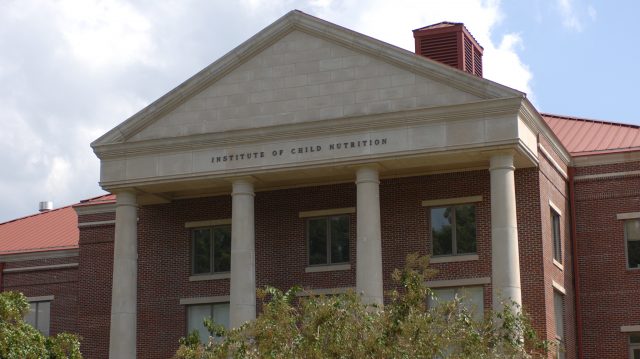
The training team at the UM Institute of Child Nutrition has developed a series of interactive virtual training sessions to continue assisting child nutrition professionals across the country, including those who work in nutrition programs in schools and child care centers. Submitted photo
OXFORD, Miss. – The Institute of Child Nutrition, part of the School of Applied Sciences at the University of Mississippi, has transitioned to offer extensive virtual services so it can continue supporting child nutrition professionals across the country.
Historically, one of ICN’s largest outreach efforts has been face-to-face training for child nutrition professionals. The institute presented more than 500 in-person sessions in 2019, but because of COVID-19 travel and event restrictions, it has not been able to provide in-person training since March 13.
With the help of the institute’s Information Services Division, the ICN training team developed a schedule of interactive virtual training sessions through Zoom to continue assisting child nutrition professionals across the country.
“Since March 13, ICN has offered 117 (virtual) sessions to over 2,250 participants, and we have virtual training sessions scheduled through Jan. 15,” said Lisa Rogers, the institute’s associate director of training. “For the ICN training team, this has been a rewarding experience to be able to connect with the true heroes of child nutrition who have been on the front lines during this challenging time.”
The only national center dedicated to research, education and training for child nutrition programs, ICN primarily serves individuals who manage and operate federally funded child nutrition programs such as the National School Lunch Program, School Breakfast Program, Child and Adult Care Food Program, and Summer Food Service Program.
“We develop research-based educational resources and information free of charge to assist professionals in managing and operating their programs successfully,” said Aleshia Hall-Campbell, the institute’s executive director. “We serve as a centralized repository of information and services to aid and assist child nutrition professionals.”
ICN relies on consultant trainers who travel to nutrition programs across the country to provide outreach for face-to-face training. In March, the ICN staff updated many of their face-to-face trainings to fit a virtual format. They worked with consultant trainers on the new, virtual activities and how to use Zoom for training.
“There was a huge learning curve for everyone involved with virtual training,” Rogers said. “But our trainers and training team members have successfully embraced the virtual format, and the sessions have been very well received.”
The ICN offers training for people working in nutrition programs in schools, child care centers and homes, state agencies and adult day cares. They also provide resources to help community organizations, dietitians and other stakeholders who work with federal programs.
“The ICN always does a fantastic job with training,” said Daniel Westmoreland, child nutrition director for Oxford School District. Westmoreland and his team have completed several training sessions with ICN, including Basic Culinary Math for School Nutrition Professionals and Healthy Cuisine for Kids.
“Child nutrition has many guidelines and changes to follow, so constant training is vital,” Westmoreland said. “We are very lucky and blessed to have the ICN right here in our hometown.”
Before transitioning to strictly online and virtual services, the ICN had already provided 161 face-to-face training sessions and reached 3,830 participants in 2020. The institute has 100,800 active users on its free, self-paced e-learning website.
“The work that we do is extremely important, and now more so during this pandemic,” Hall-Campbell said. “Being able to provide free training and resources about how to incorporate strategies and practices such as social distancing, handwashing and more have been useful and helpful during this time.”
The ICN was established at Ole Miss in 1989 by Congress through the Richard B. Russell National School Lunch Act. It was created as a national center dedicated to conducting applied research, education, training and technical assistance for child nutrition professionals across the country.
For more information about the ICN, visit https://theicn.org/. For more information about the School of Applied Sciences, visit https://sas.olemiss.edu/.